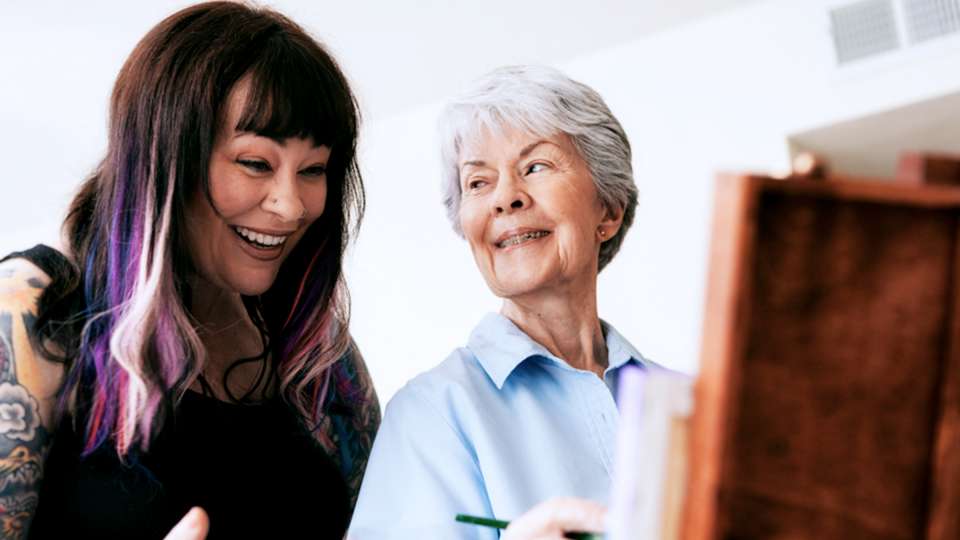4 Things to Know When Caring for an Older Family Member

If you’re one of the 41.8 million Americans who care for an older family member or friend over the age of 50, you know the role has its ups and downs.
“It is really hard to be a family caregiver,” says Dr. Katherine Bennett, who sees patients at the Senior Care Clinic at Harborview Medical Center. “It can be very satisfying, but it can also be emotionally stressful and physically difficult.”
To help you and the millions of others taking care of a parent, grandparent or loved one, Bennett shares her top tips for navigating this complex relationship.
Discuss needs and wishes early
While there are situations when you might unexpectedly become a caregiver — for example, a medical emergency — most often, it’s a role that unfolds slowly over time.
“In the case of something like Alzheimer’s, it’s a slow-developing relationship,” Bennett explains. “Over the natural course of the disease, the older adult might need help with managing finances, medications and making sure their household is taken care of. Then more physical needs like bathing and dressing come on. It’s a natural progression.”
To make sure you’re not caught off guard, sit down with your parent or loved one early to discuss needs and preferences, such as where they’d like to live if they need assistance, who their surrogate decision maker will be and what their medical wishes are for end-of-life care.
This conversation can happen right after a diagnosis or even when your parent or grandparent is still healthy and living independently.
“It’s good for the caregiver to know wishes in advance,” Bennett says. “If a parent wants to move in with their child, but it’s just not feasible, that discussion needs to happen early so it’s not a crisis situation where they are having difficulty and need to move all of a sudden.”
Divide up responsibilities with family members
In addition to talking about needs and wishes with the older adult who you’ll be caring for, it’s equally important to discuss responsibilities with siblings and other family members.
“Caregiving often falls on one person in the family,” Bennett says. “Talking in advance with siblings, even if it’s knowing who wants to or can do something, is good for knowing who else can help out.”
For example, if you’re designated as the main caregiver responsible for day-to-day tasks, perhaps a sibling can help with paying bills and another relative can manage estate planning. This gives family members who live far away a chance to contribute.
You can also use these family discussions to decide who can serve as backup if the primary caregiver needs a break.
“Having these discussions can help avoid family conflict,” Bennett notes. “You don’t know what’s coming, but it’s good to talk about who can do what in advance so you’re prepared.”
Understand your role as a caregiver
Things aren’t just on autopilot once discussions have been had and responsibilities are divvied up.
“Every caregiver relationship is different, depending on the relationship the older adult and adult child had before,” Bennett notes.
You and your loved one may communicate well — or you may not. You may spend time together frequently — or you may not. Either way, disagreements may arise once you ease into your caregiving role.
The best thing to do, Bennett says, is to respect your parent’s boundaries and not try to bulldoze them with what you think is right.
“The most successful caregiver relationships are when the adult child wants to help with the things that are really needed and respects that their parent is an independent person,” she explains.
For example, if your parent or grandparent isn’t taking their medications or following through on their treatment plans, it’s not up to you to strongarm them into doing so.
Instead, ask if you can sit in on their next doctor’s visit and let the medical professional assess their needs and lead the discussion with them.
“The patient needs to be the decision maker whenever possible,” Bennett says. “I always check in with them to see if their preferences are not aligned with the care plan, and then the caregiver can be brought into the discussion to implement the plan and make sure it’s working for everyone.”
Take care of yourself first
While much of your time and energy may be taken up with caring for your loved one, it can be easy to forget about your own needs — and this only leads to trouble.
“It’s the idea of putting your oxygen mask on first,” Bennett says. “It’s very important for caregivers to take care of themselves because it all falls apart if the caregiver is stressed.”
Make sure you’re keeping up with your own medical care and taking time to yourself to unwind. And, if you need, don’t be afraid to ask other friends and family members to step up so you can take a temporary caregiving break.
There are also a number of resources available to help caregivers, so reach out if you need help.
“We have so many people right now who are caring for their children and their parents simultaneously, and that is a very, very hard thing to do,” Bennett says. “It’s a matter of checking in with yourself and pulling in additional help where you can.”
Local resources for family caregivers
Alzheimer’s Association (Washington state chapter)
Area Agency on Aging for Seattle and King County
Community Living Connections
King County Veterans, Seniors and Human Services Levy programs
Lifespan Respite Washington
Washington State Department of Social and Health Services

 Healthy ideas for your inbox
Healthy ideas for your inbox





